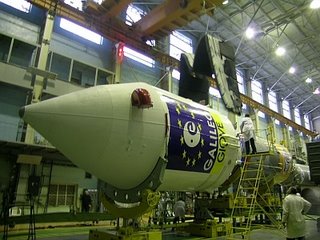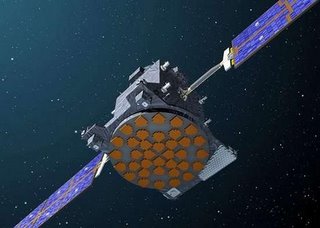 One of the most egregious long-term failures of our media (and some of our domestic politicians) must surely be their complete inability to come to terms with the EU's Galileo satellite navigation system.
One of the most egregious long-term failures of our media (and some of our domestic politicians) must surely be their complete inability to come to terms with the EU's Galileo satellite navigation system.Not only has it failed to pursue the question of why we need an expensive duplicate system, when the US has committed to providing its own "Navstar" GPS entirely free of charge, but it has also faithfully parroted the EU mantra that Galileo is a "civilian system under civilian control".
 Even without evidence to the contrary, though, it is self evident that GPS is a dual-use system – it has both civil and military applications. Furthermore, since the sharp end of each satellites is simply nothing more than a transmitter, the actual function of the system is user defined. Although fitted with the same equipment, a red truck with a blue flashing light rushing to a fire may be civilian while a green truck filled with men with guns rushing off to a fire-fight is a military application.
Even without evidence to the contrary, though, it is self evident that GPS is a dual-use system – it has both civil and military applications. Furthermore, since the sharp end of each satellites is simply nothing more than a transmitter, the actual function of the system is user defined. Although fitted with the same equipment, a red truck with a blue flashing light rushing to a fire may be civilian while a green truck filled with men with guns rushing off to a fire-fight is a military application.That Galileo does have many military applications (some of which are illustrated, left and right) has considerable political implications. Yet, even though the French defence minister, Michèle Alliot-Marie, confirmed as early as December 2004 that the system had military applications that the French intended to use, the media has largely stuck to the legend that it is a civilian system.
 As time has progressed, however, it has become increasingly clear that the business model on which Galileo is based is unlikely to recover anything like the original investment and, two years ago it was clearly evident that the economics would be largely dependent on the spin-offs from arm sales.
As time has progressed, however, it has become increasingly clear that the business model on which Galileo is based is unlikely to recover anything like the original investment and, two years ago it was clearly evident that the economics would be largely dependent on the spin-offs from arm sales.Add to that the partner nations, which include China, India, Ukraine and Russia (the latter doing deals for hi-tech military equipment with EADS) and the possibilities for mischief are endless, especially as there is no effective politico-military control system within the EU that could mirror the US system and keep Galileo out of enemy hands. In that sense, the fact that it is a "civilian" rather than (originally) a military system – like "Navstar" is a disadvantage.
With the EU now warning that costs are "spiralling out of control" – all the indications short of certainty are that the military dimension will play a larger and much more important part in the development of the system
Thus, when one finds as of 12 October that EU transport commissioner Jacques "Wheel" Barrot - nominally in charge of Galileo development – has been telling a conference in open session that although, "Galileo was supposed to be a civilian system… I wonder whether we shouldn't question that," this is highly significant
 "Using it for military purposes, for defence purposes ... would be very interesting in terms of paying for the infrastructure and the investment," he says, affirming that which we have been maintaining all along – that it is essential to the economics of the programme.
"Using it for military purposes, for defence purposes ... would be very interesting in terms of paying for the infrastructure and the investment," he says, affirming that which we have been maintaining all along – that it is essential to the economics of the programme.As we have written, unrestricted military application of the Galileo system has massive implications, not least for our relations with the United States and our Nato partnership. Thus, at this stage, where it now becoming clearly evident that there is a military dimension to the system, one would have thought that the MSM would now be taking an interest and kicking off a debate.
But, to date, there has been nothing. Surely, though, there must come a point when this can no longer be put down to the innate stupidity and ignorance of the MSM hacks, and one has to look to something more profound to explain their inertia? Whatever that might be, it is certainly germane to ask what is it going to take for them to take an interest in such a vital matter?
COMMENT THREAD
